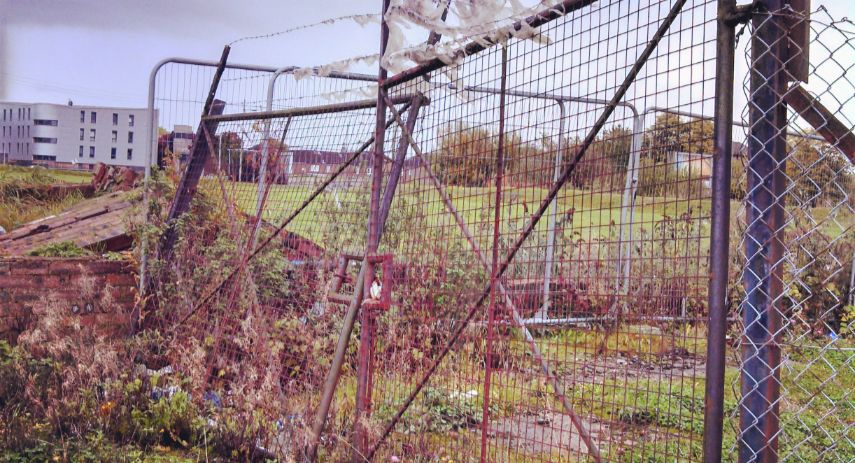
Exploring new tools to tackle urban land challenges
David Stewart

Land reform in Scotland is often seen through a rural lens, but it’s just as critical in our towns and cities. Across urban Scotland, the way in which land and property are used and owned can impact a place. For example, long-term vacant and derelict sites can hold back regeneration, limit opportunity, and negatively affect everyday life. As part of our ScotLand Futures initiative, we’re exploring how land reform can help address these urban challenges. This blog looks at the potential role of Compulsory Sales Orders in bringing neglected urban land back into use.
Across Scotland’s towns and cities, vacant and derelict land continues to have a negative impact on communities. Empty buildings and neglected plots often sit unused for years, creating blight, safety issues and lost opportunities for regeneration.
There is no single solution to this challenge, but Scotland already has a well-established legal mechanism in the Compulsory Purchase Order (CPO). CPOs allow public bodies to acquire land in the public interest, usually for larger infrastructure or regeneration projects where there is a clear plan for redevelopment.
While powerful, CPOs can be complex and resource intensive. Local authorities must demonstrate a specific use for the land and have the capacity to deliver it. This makes them less suited to smaller, problematic sites where there may not be a readymade plan for reuse.
What could Compulsory Sales Orders add?
One idea explored in recent years is the Compulsory Sales Order (CSO), first proposed by the Scottish Government’s Land Reform Review Group (LRRG) in 2014. Unlike a CPO, a CSO would not result in public bodies owning land. Instead, it would require an owner to sell a long-term vacant or derelict land via public auction, opening up opportunities for new owners to bring the site back into use.
This concept has attracted interest because it could complement CPOs by addressing smaller‑scale sites, which often have a significant local impact but can be difficult to tackle using existing powers. By requiring sale rather than purchase, CSOs could provide a clearer route for stuck or neglected sites to move back into active use.
You can read more about how CSOs could work in the SLC’s proposal in 2018.
Opportunities for communities
In addition to the private sector, CSOs could help create opportunities for community‑led projects. Research by Community Land Scotland shows that urban communities are increasingly interested in owning land and buildings to improve their areas. Yet access to suitable sites is often a major barrier.
By making land available for sale in a transparent process, CSOs could help more communities gain access to the spaces they need.
Questions for practice
Introducing a CSO power would raise practical design choices that practitioners in the built environment will recognise, for example:
- Eligibility and tests: How should ‘long‑term’ vacancy and ‘harm’ be defined and evidenced in an urban context?
- Safeguards and rights: What due process, appeal routes and owner protections are appropriate?
- Auction design: How can disposal be transparent and accessible while ensuring delivery by the successful bidder?
- Capacity: What support would local authorities and public agencies need to use any new power effectively and fairly?
These are questions where professional insight from planning, regeneration, housing and heritage practice is invaluable.
Looking ahead
Scotland’s legal framework for land assembly is already evolving, with the Scottish Government’s ongoing review of CPO powers set out in its most recent progress report. Exploring how tools like CSOs could complement existing powers is part of a wider conversation about how land can be used more effectively for the benefit of people and places.
At the Scottish Land Commission, we are interested in how these different approaches could work together to tackle vacant and derelict land and support regeneration in urban areas.
Join the ScotLand Futures conversation
We are inviting views through ScotLand Futures, a national conversation exploring what a fully reformed approach to land in Scotland could look like and how we can make it happen. This is an opportunity to share your experiences of tackling urban land challenges and to help shape what the next steps could be.
Share your views through our online survey.
Survey closes 6 September 2025.
References:
- Scottish Land Commission (2018) Compulsory Sales Orders: A Proposal from the Scottish Land Commission https://www.landcommission.gov.scot/downloads/5dd6a16d88752_CSO-Proposal-final.pdf
- Scottish Land Commission (2018) Blog: Under the hammer: Compulsory Sales Orders explored https://www.landcommission.gov.scot/news-events/news/under-the-hammer-compulsory-sale-orders-explored
- Scottish Government (2024), Compulsory purchase reform: Progress report.
- Community Land Scotland, Findings from the Community Ownership Hub.